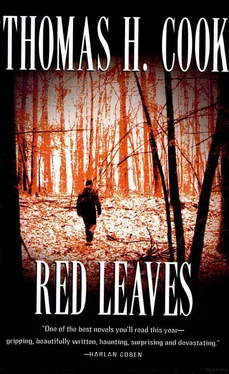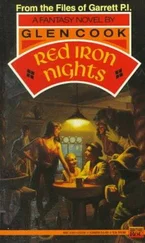"Warren?"
He shrugged.
I leaned toward him. "You were there that summer," I said. "What happened?"
Warren looked up shyly. "Dad thought she did something," he said. "Mom." He glanced about as if to make sure no one else was listening. "Something with this other guy. "You know what I mean."
"Mom?" I was astonished. "What other guy?"
Warren took a sip. "Jason Benefield. The family lawyer, remember? Used to come over with papers for this or that."
I recalled him as a tall, well-dressed, and very courtly man with a great shock of gray hair, handsome in the way of old boats, rugged, worn, but graceful.
"Do you think it was true, what Dad thought?" I asked.
"Maybe," Warren said. He saw the surprise in my face, how little I'd believed it possible that he noticed anything. "I'm not stupid, Eric," he said. "I can see things."
"What did you see exactly?"
"That Mom was ... that she liked this guy," Warren answered. "And that he felt the same way about her." He finished the drink and waved for another. "At first I didn't know what to think about it, you know? Mom and this guy. But then I knew how Dad treated her, like she was nothing except when his cronies came over. And so I just thought, Well, okay, good for Mom, you know?"
Peg arrived with Warren's beer. He smiled at her, but she didn't smile back.
"Bitch, huh?" Warren muttered after she'd stepped away. "But then, they all are, right?" He gave a quick self-mocking laugh. "At least to me."
"What made Dad suspect her?"
Warren ran his fingers through what was left of his hair. "Somebody tipped him off."
"Who?"
He hesitated, and so I knew I wouldn't like the answer, but comfort no longer mattered to me. "Who?" I repeated sternly.
"Aunt Emma," Warren answered. He took a long drink, glanced into the dying foam, then looked at me. "She saw Mom and Jason together. I mean, not in a bad way. Like in bed, or something like that. Mom would never have done anything, you know, at home. But one day Aunt Emma came over to bring some tomatoes from her garden. She heard Mom and this guy talking." He shrugged. "You know, the way people talk when there's something between them. You don't have to hear the words."
"And Aunt Emma told Dad?"
Warren nodded, returned his gaze to the glass, remained silent for a moment, then looked up. "He beat the hell out of her, Eric. I knew it was coming, so I took off. When I got back, Dad was sitting in the living room, drinking. Mom was upstairs. She didn't come down until the next morning. That's when I saw what he'd done to her." He seemed to return to that grim day. "I got real upset. I wanted to hit him. Like he hit her. I wanted to beat the shit out of him." He shook his head. "But I didn't do anything. I didn't even mention it." His eyes glistened slightly. "I never had any nerve, Eric. All Dad had to do was look at me, and I crumbled."
I shook my head. "I had no idea about any of this."
Warren nodded. "You couldn't have done anything, anyway. Nobody could do anything with Dad. Besides, he was good to you."
"Yes, to me," I admitted. "But you had to—"
Warren waved his hand to silence me. "Oh, don't worry about me and Dad. Then or now. Hell, I don't care if I never see him again." He took a long pull on the beer, one that left no doubt that it was my father's anger that had hurled him off the wagon. "Water under the bridge."
Except that it wasn't. At least not for me.
"I keep thinking about things, Warren," I told him. "I know it's because of this thing with Keith. But I keep going back to our family, too."
Warren laughed. "Why bother? They were gone before you grew up. Mom. Jenny. You were still a kid when they died."
"But I don't want to be a kid anymore," I told him. "I want to know what you know. About everything."
"I told you what I know."
"Maybe there was more," I said.
"Like what?"
"Like that insurance man you told me about. Why would he have come around the house, asking questions about Mom and Dad?"
Warren shrugged. "Who knows?"
"Dad told me there was no insurance on Mom," I said.
"Then I guess there wasn't any insurance." He took a sip of beer. "Jesus, what difference does it make, anyway?"
"It makes a difference because I want to know."
"Know what?"
The words fell like stones from my mouth. "If he killed her."
Warren's eyes grew very still. "Jesus, Eric."
"Fucked with the car some way. The brakes."
"Dad didn't know anything about cars, Eric."
"So, you don't think—"
Warren laughed. "Of course not." He peered at me as if I were very small, a creature he couldn't quite bring into focus. "What's the matter with you? Dad kill Mom? Come on, Eric."
"How can you be so sure?"
Warren laughed again, but this time, mirthlessly. "Eric, this is nuts."
"How do you know?" I repeated.
"Jesus, Eric," Warren said. "This is weird."
"What if he killed her?" I asked.
Warren remained silent for a moment, his gaze downcast, as if studying the last small portion of beer that remained. Then he said, "What good would it do, even if you found out he did?"
"I don't know," I said. "But as it stands, everything seems like a lie."
"So?"
"I don't want to live like that."
He drained the last of the beer. "Eric, everybody lives like that." He grinned and the grim seriousness of our former discussion simply fell away from him. "Lighten up, Bro—everybody's fake."
I leaned forward and planted my elbows on the table. "I want to know the truth."
Warren shrugged lightly. "Okay, fine," he said wearily. "Knock yourself out. Hell, Dad's a pack rat. Kept everything in that old metal filing cabinet, remember? Wouldn't throw it away, or anything in it. Heavy fucking thing. Remember the trouble we had moving it into your basement?" He drained the last of the beer and looked at me drowsily. "If he had a policy on Mom," he said, "that's where it would be."
SEVENTEEN
The next night, after Meredith and Keith had already gone to bed, I quietly made my way to the basement. It was a gray metal filing cabinet, the one in which my father had kept his records and which Warren and I had removed from the little house my father had lived in before I'd finally convinced him to take up residence at the retirement home.
I'd taken him to Shelton Arms on a snowy January day, then returned to the house and helped Warren pack up Dad's belongings and transport them to the basement where they'd rested undisturbed until now.
My father's old rolltop desk stood beside the cabinet. I opened it, pulled over a plain metal chair, took out a stack of files from the top drawer of the cabinet, and began to go through the yellow crumbling papers I found inside, the records of my father's many failed enterprises along with his increasingly desperate attempts to salvage them.
But that was not the history I was looking for. I didn't care that my father had failed, that his business dealings were shadowy, that he'd squandered thousands of dollars to keep up appearances, joined expensive clubs at the very time my mother was scouring local thrift shops in order to keep her children clothed.
None of that mattered because I wasn't looking for evidence of bad business decisions or foolish investments. I was Peak and Kraus, my gaze, like theirs, focused by suspicion, looking for evidence of a crime.
It emerged slowly, like a body rising through layers of accumulated silt, the excruciating details of my father's ruin. The decline began in the late sixties as his real estate holdings were decimated by soaring interest rates. Steadily, for five years, he defaulted on one mortgage after another, his banker friends no longer willing to extend further credit, so that he lost both residential lots and commercial properties, his wealth dropping from him like petals from a wilting rose.
Читать дальше












